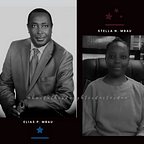Generations for Health Dialogue: The Disproportionate Impact of the Climate-Health Nexus on the Global South
To watch Generations for Health Youth Dialogues, please see videos at the Generations for Health Facebook page here.
Facilitated by Generation for Health’s Silvia Mosquera Lago and Mohamed Ramy
See a clipping of (Stella’s video presentation here).
SOURCE: Generations for Health video.
Below is a transcript of the clipping:
Silvia:
Opinion on solid waste management in Kenya
Stella:
Our handling of waste generally is really poor. I will also talk about it with regard to pesticides, the use of chemicals in our agricultural food production. There is a lot of that seeping into our lake Victoria is the most recent case. This is a source of food (fish) for most people, and the lack of management of food production systems and how that pollutes our environment is not really good.
There’s also cases where you find a car wash right next to the river. So people washing their cars and all of that waste water draining into the river, yet some people drink straight from this river or use the same water to plant and grow food. Generally there’s a solid waste issue, it’s a waste management- very broad spectrum- issue.
If you’ve heard of micro-plastic in our water, there’s a way that we’re contributing to that problem as well. The Nairobi river has been cleaned up a couple of times, but when it’s really dirty, there’s a lot of plastics that are floating around and clogging our waste systems. So, it has backward and forward linkages. It’s a big issue here, as well as in other sub-Saharan countries.
Silvia:
Should the global North be held accountable for the disproportionate impact of climate change? What role does the global North play?
Stella:
There is a role. I will go back to the economic issues that have been mentioned quite a lot. We’ve also heard about the iphone and cobalt extraction from Africa. I think you’ve also heard of cocoa and nestle, amongst other things. There’s a lot of resources that come from Africa, and there’s not, fair trade. So, in that sense there’s a lot of monies that we are worth that isn’t coming back to us.
I think in the economic sense, in that sense, the global North is sort of getting ahead (development) on these carbon activities that are impacting the global South; getting the resources and also emitting these greenhouse gases that are detrimental to the global South mostly because of the location.
We’ve read that the droughts and the floods, and most of these are centered around the global South (the equator, the tropics). So, there’s the economic aspect (carbon emissions), and there’s a lot that they are responsible for, and in that sense, with regard to the Paris agreement, should help the global South adapt. That needs financing, and that’s the conversation in general.
Ramy:
How can the aspects of the climate-health nexus be incorporated into educational systems?
Stella:
The first thought I had when you asked that is, what’s the level of climate change awareness itself. Before we talk about the nexus and how it relates to health. I think there’s a really huge gap. There would need to be a lot of education, just to begin with climate change. That’s, I feel, where we are now. That awareness around climate change itself isn’t good. Anybody who can project to climate change and the health nexus and start to think about how to solve that is already quite ahead.
Ramy:
For the youth, how can we have an attitude that is resilient to the difficulties ahead and remain proactive
Stella:
I’d say, knowing what you want to do and going for it. Having a passion for it. Knowing that you’re the person to solve it, as opposed to waiting for others. Not waiting for government. Not waiting for, even your friends. Just go out and do stuff. I don’t mean just campaigning, I mean solid stuff. I have some friends who are activists, who actually do farming and go out and plant trees. It’s stuff that we don’t take very seriously right now, living in cities and all of that, but it’s important and its empowering.
I’ve read somewhere that climate action, however little, whatever you do, whatever role you play is a good way to reduce (climate) anxiety. So, go out and do something.
Stella Nyambura Mbau PhD
Founder & CEO LOABOWA
#generationsforhealth
